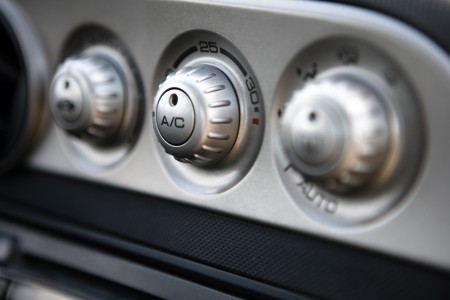
Car air conditioners can leak for all sorts of reasons. In this article, we’ll look at the construction and components of the air conditioning system in your vehicle to help you understand the answers to the question “Why is my car’s air conditioner leaking?” Let’s first try to understand why your system might start to leak.
The air conditioner in your car works like any other air conditioning or refrigeration system. In every system, a working fluid, called refrigerant, is forced through the system under pressure of the compressor. This refrigerant is cooled after compression, then allowed to expand through an orifice or expansion valve to create the cooling effect. Then the cold refrigerant is used to cool the air inside your vehicle and the process repeats itself.
The relatively high occurrence of car air conditioner leaks is due to the nature of both the refrigerant and the construction of the components in your air conditioning system. First, the refrigerant that is used in air conditioning systems has to be a relatively volatile fluid that is a gas at normal room temperature and pressure. The properties of refrigerant make it a good candidate for escaping easily for even the tightest sealed system. Also, 2 of the main components of your air conditioning system are relatively fragile. The condenser and evaporator in your vehicle are both used to transfer heat either out of the refrigerant or out of the cabin of your vehicle. In order to make heat transfer efficient, the condenser and evaporator need to be made from relatively thin metal that can be damaged easily.
The last thing that can cause air conditioners to leak is the connections between all of these components. The compressor has to be mounted to your motor so it can be driven by the power of your engine. Since your motor moves around quite a bit while you drive due to the torque of the motor, the high pressure hoses that carry refrigerant from the compressor to the condenser and from the evaporator back have to be both flexible and able to carry the high pressure. No matter how sturdy these hoses are, a few years of all the vibrations and flexing that come along with your vehicle, those connections can start to form slow leaks.
The problem with a leaky air conditioning system is that the leak will quickly cause problems. For an air conditioning system to function properly, it needs to have a very specific amount of refrigerant. Too much refrigerant can lead to extremely high pressures in the system which can damage the compressor, cause more leaks or even flood parts of the system. Too little fluid can cause pressures to get so low that the cooling effect isn’t accomplished through the expansion valve or orifice tube. This will lead to poor cooling or even no cooling at all.
All of these possible leak points make it very difficult to identify where your air conditioners leak is located. If you have a fast leak, sometimes you can find an oily spot, or notice a large hole in your condenser that can make the leak easy to find and the repair obvious. Many times however, leaks are slow due to small cracks, wobbly connections or a combination of things. These slow leaks can be the most frustrating to find and take a lot of time or money to repair.
If you suspect a slow leak in your air conditioning system, use Red Angel AC Stop Leak to seal the leak without having to search for it. Red Angel AC Stop leak is a chemical sealing agent that will remain inert in your air conditioning system and act as a lubricant until it reaches the leak point. At the leak point Red Angel AC Stop leak will for a permanent seal so your refrigerant will stay in your system and your air conditioner can function properly.
You can purchase Red Angel AC Stop leak from any of our partnering local auto parts stores like:
- AutoZone
- Advance Auto Parts
- Bennett Auto Supply
- CarQuest Auto parts
- NAPA Auto Parts
- O’Reilly Auto Parts
- Pep Boys
- Fast Track
- Bumper to Bumper Auto Parts Specialists
- S&E Quick Lube Distributer
- DYK Automotive
Pictures Provided By:
air_conditioning_leak.jpg – By Jupiterimages – Licensed by Thinkstock Photos – Original Link